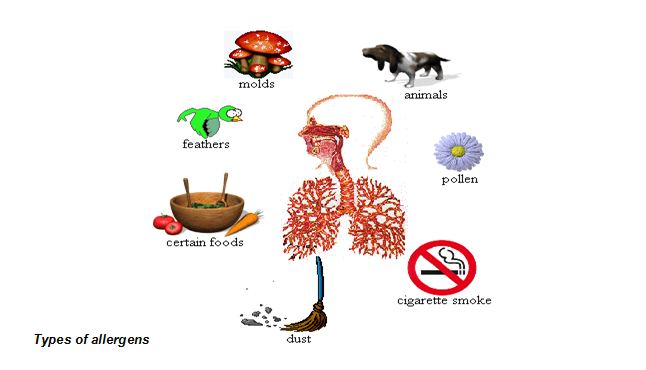Asthma is a chronic lung condition in which the airways are inflamed, causing them to be narrowed and produce excessive mucus. It makes breathing difficult and laboured. Symptoms can be triggered by cold, pollution, dust, animal dander, chemicals or even stress. Asthma can affect people of all ages, but most often starts during childhood. When severe, it can interfere with normal daily activities and result in a life-threatening asthma attack. It is often associated with other atopic diseases like allergic rhinitis and atopic eczema. As it is a genetic disease, a family history of asthma or atopy is often present.

Symptoms
- chronic cough
- shortness of breath
- wheezing
- chest pain or tightness
Diagnosis
Diagnosis of asthma is a clinical one in most situations, i.e. the presence of typical symptoms and signs that improve with treatment. In doubtful cases,a lung function test can be done. Lung function testing is usually in the form of a Methacholine Challenge test. If such facilities are unavailable, a variability of FEV1 is supportive of the diagnosis of asthma.
Treatment
Asthma cannot be cured but its symptoms can be controlled. Treating asthma early may prevent long-term lung damage and help keep the condition from deteriorating. The goal of asthma treatment is to control the disease. Good asthma control will:
- Prevent coughing and shortness of breath
- Reduce the need for quick-relief inhalers
- Maintain good lung function
- Allow one to maintain a normal lifestyle and sleep through the night
- Prevent asthma attacks that result in an emergency room visit or hospitalisation
Medications
Asthma is treated with two types of medicines: long-term control and quick-relief medicines. Long-term control medicines help reduce airway inflammation and prevent asthma symptoms. Quick-relief medicines relieve asthma symptoms during flare ups. Nowadays, most asthma medicine are inhaled. This allows the medicine to go directly to your lungs and airways. Side effects are hence minimised as doses are lower than if they were to be administered orally or through injections.
Long-Term Controller Medicines
Most people who have asthma need to take long-term control medicines daily to help prevent symptoms. These medications reduce airway inflammation and prevents airway narrowing They do not give quick relief from symptoms. Inhaled corticosteroids are the most effective option for long-term control of the inflammation and swelling in your airways due to asthma.
Quick-Relief Medicines
Quick-relief medicines help relieve asthma symptoms during a flare up. These medicines act quickly to relax tight muscles around the airways during an attack allowing the airways to open up so air can flow through them. One should take the quick-relief medicine whenever one notices asthma symptoms. If this medicine is required frequently, it means that asthma control is poor and should prompt a patient to discuss with the doctor about increasing the use of preventors.




